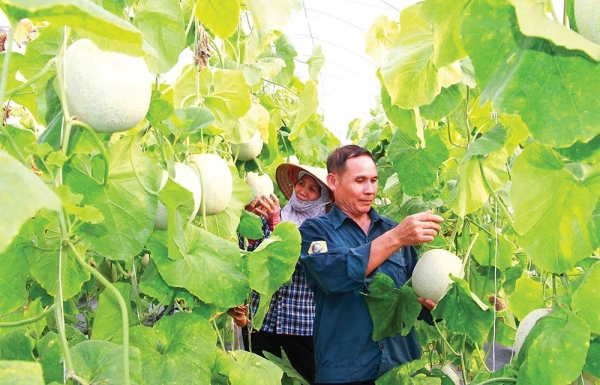
Bilateral FTA to strenghen trade flows between Vietnam and Israel
Latest
The government has reported to the National Assembly that Vietnam and Israel will likely ink a bilateral free trade agreement (VIFTA) this month, making it more favorable for the two countries to strengthen trade flows. After signing the deal, both nations will issue action programs with specific tariff schemes.
Vietnam exports around 70 types of items to Israel each year. The key exports include electronics and mobile phones and their spare parts; agro-forestry-fishery products; garments and textiles; footwear; machinery; and wooden products.
Meanwhile, from Israel, the main products are refined oil and petrol, pharmaceutical products, machinery and equipment, medical equipment, computer software and hardware, farm produce, and chemicals.
Figures from the Vietnamese Ministry of Industry and Trade show that two-way trade turnover increased from 1.2 billion USD in 2019 to 1.6 billion USD in 2020, 1.88 billion USD in 2021, and about 2.2 billion USD last year. The figure is expected to soar to about 3 billion USD next year.
According to pan-Asia consultancy Dezan Shira & Associates, in recent years, two-way trade between Israel and Vietnam has shown promising growth, and the upcoming agreement is expected to enhance it. The firm sees great cooperation potential in some sectors to be produced by the VIFTA, including agriculture, footwear, and electronics.
For example, Israel and the Middle East have a high demand for spices like cinnamon, anise, and pepper. Meanwhile, pepper production in Vietnam accounts for about 40 per cent of the world’s supply.
“Vietnam can leverage the VIFTA to increase exports of food products and consumer goods, such as seafood, cashew nuts, coffee, soft drinks, confectionery, textiles, and shoes to the region,” Dezan Shira & Associates said.
Compared to the US or EU, Israel’s standards are not as stringent, creating a promising opportunity for Vietnamese agricultural products, particularly spices from the south of the country.
 |
| Israel and Vietnam are boosting agricultural cooperation. (Photo: VIR) |
Israeli companies produce many types of fertilizers, including organic and biofertilizers, as well as specialized fertilizers for different crops and soil types. This persistence in the product range makes Israeli fertilizers suitable for different applications and industries. This is highly valued by Vietnamese businesses.
The Vietnamese agricultural sector, with its high-growth opportunities and growing need to better cater to the demands of firms and farmers, has long been on the radar of Israeli high-tech businesses.
For example, currently, Vietnam’s TH Group is boosting its cooperation with Israeli firms in its projects to produce fresh milk and agricultural products in Vietnam. Specifically, Israel’s Afimilk is providing consultancy on an automatic milking system, and cow management software for the group’s 1.2-billion USD high-tech concentrated dairy and fresh milk production project in the central province of Nghe An.
In another case, Aquaculture Productions Technologies (APT) is planning to begin its presence in Vietnam. With over 40 years of experience in providing agricultural smart solutions, and operating in many nations including in Southeast Asia, it provides solutions and services on consultancy and construction for fish farms inland and offshore, according to its CEO Michael Pascal.
Vietnam currently has nearly 4,000 hectares of basa farms, and the country is now one of the biggest exporters of this type of fish worldwide. “This will give us an opportunity to bring our high technologies to Vietnam,” Pascal said.
A few months ago, more than 50 Israeli firms later joined a business-to-business event with Vietnamese partners in Tel Aviv. They want to cooperate with Vietnamese companies in developing projects on investment in and exportation of aquatic products, cashew nuts, coffee, and pepper. Cooperation in other sectors was also discussed, including in mobile phones and spare parts, footwear, and garments and textiles.
Vietnam’s agricultural sector has great potential for development for such groups, with high technologies to be applied. For example, Agriancer is eager to introduce its high-quality plant varieties to the domestic market.
“Vietnam is focusing on controlling food safety and hygiene, so we want to market varieties here with high capacity in disease resistance. We intend to boost cooperation with local partners,” said Trinh Phuong, country manager of Agriancer.
Galcon is also seeking to sign more contracts with partners in Vietnam. Currently, it is providing automatically controlled irrigation-related products in Vietnam with tech-based cloud platforms.
“We are implementing a number of projects in Vietnam. One of the most typical is a 25-ha project in cooperation with Vineco. In this initiative, all processes from irrigation and temperature controlling to harvesting are conducted automatically,” said a representative of Galcon. “Currently, this project is entering the second stage. We also want to deploy other similar projects here.”
As of May 20, Israel had 40 valid projects in Vietnam registered at 140.7 million USD, according to the Vietnamese Ministry of Planning and Investment. Israeli projects focus on processing, manufacturing, IT, and agriculture.
“Israeli organizations and businesses are also showing interest in collaborating with local partners, particularly those involved in clean energy production, renewable energy storage technology, and solar power projects,” Dezan Shira & Associates said. “Vietnam also has large corporations that invest tens of millions of US dollars in the research and development market in Israel.”
The VIFTA can also benefit both nations in the sector of technological devices, parts, and components. Specifically, Israel is known for its technological innovation, especially in the sectors of computers and electrical products. Numerous Israeli companies lead the way in developing new technologies, producing high-quality goods that are in demand worldwide.
Israel is also known for its expertise in agriculture, particularly in innovative agricultural practices and technologies. This expertise has allowed Israeli companies to develop and produce high-quality fertilizers that are effective in enhancing crop yields and improving soil health.





















